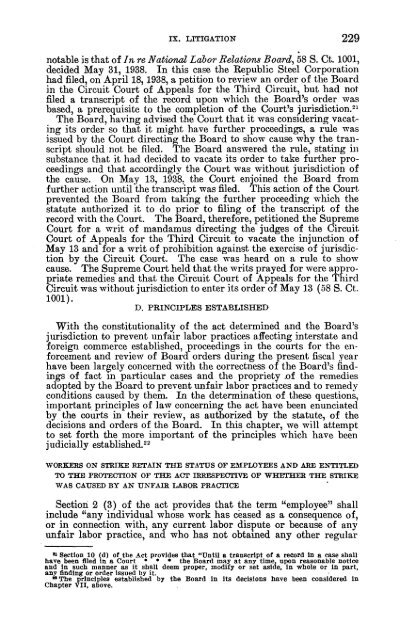NATIONAL LABOR RELATIONS BOARD
NATIONAL LABOR RELATIONS BOARD
NATIONAL LABOR RELATIONS BOARD
You also want an ePaper? Increase the reach of your titles
YUMPU automatically turns print PDFs into web optimized ePapers that Google loves.
IX. LITIGATION 229<br />
notable is that of hi, re National Labor Relations Board, 58 S. Ct. 1001,<br />
decided May 31, 1938. In this case the Republic Steel Corporation<br />
had filed, on April 18, 1938, a petition to review an order of the Board<br />
in the Circuit Court of Appeals for the Third Circuit, but had not<br />
filed a transcript of the record upon which the Board's order was<br />
based, a prerequisite to the completion of the Court's jurisdiction.21<br />
The Board, having advised the Court that it was considering vacating<br />
its order so that it might have further proceedings, a rule was<br />
issued by the Court directing the Board to show cause why the transcript<br />
should not be filed. The Board answered the rule, stating in<br />
substance that it had decided to vacate its order to take further proceedings<br />
and that accordingly the Court was without jurisdiction of<br />
the cause. On May 13, 1938, the Court enjoined the Board from<br />
further action until the transcript was filed. This action of the Court<br />
prevented the Board from taking the further proceeding which the<br />
statute authorized it to do prior to filing of the transcript of the<br />
record with the Court. The Board, therefore, petitioned the Supreme<br />
Court for a writ of mandamus directing the judges of the Circuit<br />
Court of Appeals for the Third Circuit to vacate the injunction of<br />
May 13 and for a writ of prohibition against the exercise of jurisdiction<br />
by the Circuit Court. The case was heard on a rule to show<br />
cause. The Supreme Court held that the writs prayed for were appropriate<br />
remedies and that the Circuit Court of Appeals for the Third<br />
Circuit was without jurisdiction to enter its order of May 13 (58 S. Ct.<br />
1001).<br />
D. PRINCIPLES ESTABLISHED<br />
With the constitutionality of the act determined and the Board's<br />
jurisdiction to prevent unfair labor practices affecting interstate and<br />
foreign commerce established, proceedings in the courts for the enforcement<br />
and review of Board orders during the present fiscal year<br />
have been largely concerned with the correctness of the Board's findings<br />
of fact in particular cases and the propriety of the remedies<br />
adopted by the Board to prevent unfair labor practices and to remedy<br />
conditions caused by them. In the determination of these questions,<br />
important principles of law concerning the act have been enunciated<br />
by the courts in their review, as authorized by the statute, of the<br />
decisions and orders of the Board. In this chapter, we will attempt<br />
to set forth the more important of the principles which have been<br />
judicially established.22<br />
WORKERS ON STRIKE RETAIN STATUS OF EMPLOYEES AND ARE ENTITLED<br />
TO THE PROTECTION OF Tizte. ACT IRRESPECTIVE OF WHETHER THE STRIKE<br />
WAS CAUSED BY AN UNFAIR <strong>LABOR</strong> PRACTICE<br />
Section 2 (3) of the act provides that the term "employee" shall<br />
include "any individual whose work has ceased as a consequence of,<br />
or in connection with, any current labor dispute or because of any<br />
unfair labor practice, and who has not obtained any other regular<br />
"Section 10 (d) of the Act provides that "Until a transcript of a record in a case shall<br />
have been filed in a Court • * • the Board may at any time, upon reasonable notice<br />
and in such manner as it shall deem proper, modify or set aside, in whole or in part,<br />
any finding or order issued by it.<br />
" The principles established by the Board in its decisions have been considered in<br />
Chapter VII, above.

















